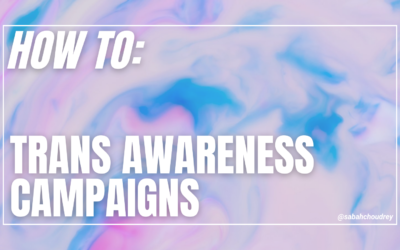I joined the ‘Campaign Stories’ panel at Campaign Bootcamp in April 2019, with two other brilliant campaigners Patrick Vernon and Sohail Jannesari chaired by Tamara-Jade Kaz sharing our journeys, challenges and personal highlights. After stumbling over being called a campaigner and then self-defining as a reluctant activist, I found a lot of joy and passion revisiting and retelling those quiet conversations and small actions that led to the birth of Trans Pride Brighton and Queer Picnic. There were three great questions from participants that I wanted to share with you and my thoughts on it, plus one question on self-care that we didn’t get time to answer.
‘How do you stop your ego from getting in the way?’
-
- Honestly ask yourself and find out the honest answers: ‘Where is my ego? Where is my head? Where is my heart?’ Are you all over the place? Do you need to ground yourself? I think it’s okay to have different answers, just make sure you know what part you are leading with.
- I believe we start with our ego in these movements; I started with my ego, but my ego was wounded from constant racism, disappointment, hurt. I was desperate to find a movement and led with a hurt ego for a while. But the movement and the fight is bigger than me, and my hurt ego can’t be bigger than that.
- Make sure you ask the questions you are asking of the rest of your community and allies to yourself too. Are you listening? Are you learning? Are you stepping up and stepping in? Are you uncomfortable?
- Create spaces for others you can trust, who have similar positions, lived experiences and identities to check you, question you, call you in.
- Keep reflecting, because your ego will change, wound, grow, recover, heal. Reflect on your message constantly: ‘Is my message still the same? Because my ego won’t be.’
‘How do you get past hate? I hate white people.’
-
- To be honest I was hateful too. I was hateful towards anyone who couldn’t see the problem and at anyone who was part of the problem. Straight people, cis men, cis women, white people… But there was a slow turning point where that changed. I think it was getting into psychotherapy and youth work… Where I had to take a step back because these roles mean I am supporting others, including straight/cis/white people. I’m following a client’s agenda (not mine), listening to what young people want (not what they should want). These practices work because I’m trying to understand the world from their point of view and be present, show empathy and love and let myself change and grow as a person. Hate is a block against all of that. I 💯 believe in youth empowerment and psychotherapy; I would be failing my community including myself too if I let hate get in the way.
- If your hate is leading you to reject people, understand that our communities are all connected. And our communities get smaller when we exclude others.
- Practice compassion. Try and come from a place of understanding that others have needs of their own, just as you do. We don’t have to accept or agree with what we hear but we can still be compassionate.
- If this feels too hard, maybe interrogate what it is that you hate? This can tell us something about ourselves, usually something we are afraid of finding out. Does your hate come from a defensive, wounded or scared place? Find a way you can be vulnerable with yourself and explore this somewhere you feel safe.
- Remember anger is not always hateful. There is a place for righteous anger and anger is still valid.
‘How do you deal with being the only xyz in a room and feeling isolated?’
-
- Know what being the only xyz in a room will do to you… ground yourself before/during/after
- Try not to internalise it, those comments you hear, the looks you see, the messages you receive; that’s how oppression works; It isolates us, loudly through explicit violence, or quietly through everyday microaggressions, and then shrinks us, mutes us, until we disappear. Or we isolate ourselves, making ourselves smaller to try and control the room, but we internalise it until we silence ourselves. The room can eat us up. Be aware of how oppression wants to you to feel like the only xyz in a room and push it out, keep it out.
- Have your BFF or activist buddy on speed-dial. Tell them where you are at, in that moment wherever you are (emotionally, geographically, literally). Ask them to affirm you and your mission and that your message is necessary, valid and important.
- Create boundaries. What are you willing to do? In a white/cis/straight/male/able-bodied space? In a defensive/fragile/guilty space? Where the loudest voice is the privileged voice? Be vocal about your boundaries (emotional, practical, simple, etc) to someone, even if you write them down to tell yourself.
- Be totally open and say it like it is. Do you have a platform? Can you take the mic? Can you take over the news feed? Ask to the public, ‘Why am I the only xyz here? What has gone wrong to let this happen? When could this have been avoided?’ Direct it to the audience or organisers or whoever invited you there.
- Be totally open and wear it like it is. Jacob V Joyce wrote it on their TOKEN jumper. Don’t have to say anything but a silent intervention like that is powerful. Make others as uncomfortable as you felt. Because it’s about them, not you. They isolated you, they had power to influence the room. And remember you are not alone.
‘How do you (self)care for yourself as an activist?’
-
- What even is self-care? In any moment, tune in with yourself. Find out what your body, mind, heart needs & give it to yourself. I know it’s not always that simple! But try to be honest when you’re being indulgent, procrastinating, avoiding yourself – I’ve been there too.
- State your boundaries e.g. at events I will talk to white people about white privilege, give my time, emotional labour, care & solidarity for 1 hour to all white folks present. But that’s all. I will preface/end my sessions with a request to white folks something like ‘please don’t talk to me about whiteness, how you feel about it, demand my advice on anti-racist practice, collect ally cookies outside because I’m going to be putting my energy back into my QTIPOC community & working on my own anti-racist practice.’
- I do the same with gender. I invite all silly/offensive/inappropriate questions for 1 hour. I won’t answer every question (I have my own boundaries on what I will share & who with; sometimes to save time & energy I direct personal questions about my ~Transition~ to my blog/TEDx talk) & I will explain why I won’t answer certain questions. After 1 hour questions directed to google & the many other trans folks who have answered it online. I’m explicit, transparent, in control.
- “Shouting ‘self-care’ at people who actually need ‘community care’ is how we fail people” – Nakita Valerio. Sometimes we need care from our communities, from more than just one person. From peace to purpose, from compassion to commitment, we need community care. I am part of a community I care for & I am a part of a community that cares for me. I guess this is about balancing myself as an individual and community/ies as a bigger picture. We are not alone.
- Radical activism needs radical healing. Whatever radical/activism/healing is. Go beyond bath bombs & mirror selfies. And to be totally honest I am still working on it.




0 Comments